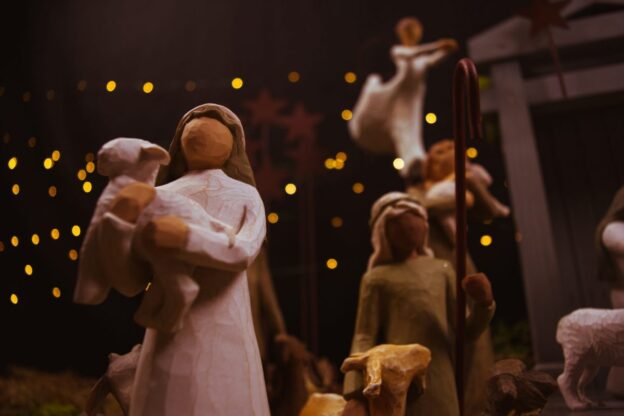According to the church calendar, we are in the season of Eastertide which marks the 50 days between Easter Sunday and Pentecost. I like the idea of Easter being more than just a morning or a day but a whole season in which we celebrate Jesus’ resurrection and what it means for our lives. There are many angles from which we can look at the topic of hope and explore what it means to live hopefully.
Let’s focus on a couple of verses in Hebrews 6 that use the symbol of an anchor to describe hope. “We have this hope as an anchor for the soul, firm and secure. It enters the inner sanctuary behind the curtain, where our forerunner, Jesus, has entered on our behalf.” (Hebrews 6:19-20a, NIV)
Maybe it would be helpful to touch on a definition of hope. Sometimes we can get a little fuzzy about the difference between hope and faith. Here are some definitions that help me keep them separate in my mind:
Faith involves trust. When we have faith, we are trusting in someone or something. Having faith means that we trust God’s promises to be true, largely in part because we trust God to be true.
Hope is confident waiting. Hope allows us to wait confidently for God to keep his promises.
Here’s an example that all the teachers and students will like:
The last day of the school year is coming up. In my county it is Friday, May 21st. That is the day my home turns into a frat house. Teachers and students can have faith in that. It hasn’t happened yet, but they are confident it will. They have faith, based on the promise of the school calendar and a history of the county adhering to the calendar.
Hope is what fuels the end-of-the-year excitement and planning. Hope is what drives students and teachers to countdown the days and plan what they are going to do first. Hope gives a vision of what summer life will be.
Hope turns the last few weeks of school from a march through time into a journey toward summer! Can you sense the difference I’m talking about? Faith gets us there, but hope makes it a much fuller experience.
After sitting with this for a while, I wonder if we might be operating with a deficit of hope. Maybe some of us are going through the motions of faithful living without the benefit of hope.
I want to share with you the story of how this sermon came together. I have a process of preparing. I wrote a sermon, but I didn’t like it. I started over. I stayed up late and wrote another version of the sermon which was a bit better – but still not great. Then, in the quiet of my house, I heard, “You struggle to hope. You are having a hard time communicating about hope, because you struggle to hope.” So I called it a night and went to bed. I woke up the next morning and while I was making sandwiches, I heard, “Tell them you struggle to hope.” You want me to begin a sermon on hope, by announcing that I struggle to hope?! Yes!
So, I am telling you that I struggle with hope. It makes sense based on my story. Wounded by people who should have known and done better. It’s like I was programmed at an early age not to hope for things – things I should have been able to count on.
God has healed me and is healing me, but I didn’t even realize until this week that life had snipped the wires in my soul that were connected to hope. The good news is when God shines the light on something in your soul, it’s usually because God is ready to work there.
The first thing I’ve learned while wrestling with hope is that hope is essential. Hope is not a bonus. Sometimes we are tempted to think hope is a nice extra or a soft emotion that feels like a luxury more than a necessity. But in reality, hope is a very powerful force that God gives to those who believe. It turns the Christian life from a heads-down march toward eternity into abundant life.
In his first letter to the Corinthians, Paul boils down the essentials of the Christian life to faith, hope and love – the big three. Paul writes that we can’t do the Christian life without hope. By putting them together, he is saying that hope is as indispensable as faith and love. It’s not the “frosting on the cake” for those lucky enough to be predisposed to hopefulness. Hope is mixed into the cake batter. It can’t be separated out.
But here’s more good news. God has promised to provide everything we need. Just like faith and love, hope is a grace, a gift. God can restore the ability to hope. We don’t have to work it up or manufacture it within ourselves. We can ask and God will give it. In fact, I believe God is always offering us what we need. So: is there something that needs to be healed so that you can receive God’s hope?
We don’t get the option of putting hope in the “bonus” category for super-Christians, or for naïve Christians who just haven’t learned to lower their expectations yet. We are all called to hope.
How might this happen?
You must be connected to the anchor.
Let’s go back now to Hebrews 6: “We have this hope as an anchor for the soul, firm and secure. It enters the inner sanctuary behind the curtain, where our forerunner, Jesus, has entered on our behalf.”
The Bible uses a lot of figurative language. Have you ever noticed how timeless most of these word pictures are? We still plant with seeds. We still care for animals. Potters still work with clay, and we bake with yeast. Those pictures would translate for thousands of years.
And here, Scripture offers us another image. Hope is like an anchor. The basic design and function of anchors have not changed very much since Hebrews was written. It’s not complicated. You find something heavy, tie a rope to it, and toss it overboard!
So when the writer of Hebrews mentions an anchor here, we all get an instant picture in our minds. It almost immediately begins to speak to us at a deeper level. Reading the “anchor” entry on Wikipedia was almost like reading a devotional! “An anchor prevents drifting due to wind or current.” That preaches, doesn’t it? “Without an anchor, a craft will drift in whatever direction the current is going. Anchors allow a boater to stop rowing or park the boat. Anchors can be used as an emergency brake to keep from crashing into other vessels or obstacles.”
Here’s something that makes the anchor a great symbol for hope. It’s not enough to be convinced an anchor is a good idea, or even just to buy an anchor. It’s not enough to bring your anchor with you on your boat trip. You have to be connected to the anchor before it’s any use.
It would be ridiculous to toss an anchor overboard that wasn’t connected to the boat! The anchor would do exactly what it was meant to do – it would sink to the bottom and stay there. But without a connection, it does the boat no good.
You and I have to be connected to our anchor. And the writer of Hebrews wants us to know that we aren’t just connecting to the universe or some unspecified force of goodness as our hope. Hebrews chapters one through five lay out the case for who Jesus is. By the time we get to chapter six, there should be no confusion. We are called to place all of our faith and hope in Jesus. Jesus is our hope; Jesus is the anchor.
Just believing that Jesus is Lord, though, is like buying an anchor and putting it in the boat. But in order for an anchor to work, it has to be connected. And we have to be connected to Jesus through trust to receive the promise of anchoring hope.
What is your connection to Jesus like? Connection isn’t formed by having information about him. We must have personal trust. Think of the ways you are connected to the people you love. You may anticipate what they are thinking. You recognize the sound of their voice. You are comforted by their presence. You enjoy just being together and look forward to seeing them.
We can be connected to Jesus in similar ways. If you are struggling with hope or anything else promised to believers, check the connection. It might be that you are tossing your anchor overboard without a rope attached. Your church family stands ready to help you form this connection. We love to walk with people as they form trust with God.
Sometimes, the first step is to disconnect from other things you’ve been using as an anchor. Humans crave all sorts of things to provide security. It might be wealth, education, skills and abilities, health. Eventually, all these temporary anchors prove to be insufficient. At some point, our boat will get too big, or the water too deep, or the winds too strong, and these anchors will fail.
What are you using as an anchor? Anything less than a living hope in Jesus won’t be strong enough.
When an anchor is connected by rope, a boater doesn’t attach it once and then walk off to never think about it again. Rope isn’t indestructible. It can rot if it’s not tended to. This connection between the boat and anchor needs care and attention just like anything that you want to last. Take some time this week to sit with that image; ask God to help you see what you need to notice about your connection.
And when that connection is strong, we can confidently throw our anchor overboard, knowing it will hold us in place even if we lose sight of it. Are you willing to lose sight of the anchor?
Look at Hebrews again: “It enters the inner sanctuary behind the curtain where our forerunner Jesus has entered on our behalf.”
This is a reference to the Old Testament temple design that created a space called the Holy of Holies, where only the High Priest would enter to meet with God on behalf of the people. It was separated from the public space by a curtain. What happened behind the curtain was hidden. The writer of Hebrews says when we lower our anchor of hope in Jesus, we lose sight of it. It enters into the inner sanctuary where the High Priest – Jesus – is at work.
I hear two things in this description:
First, we don’t always get to see what God is doing. It may be hidden out of sight from us. What’s the question we deal with the most – why? Why expresses our desire to see what’s happening under water or behind the curtain. But this image of the anchor helps us. Boaters learn to trust the anchor is working, even though they can’t see it. Only in the most shallow, clear water can you see your anchor. But who wants to stay there? The good work happens in the deep places.
The same is true in our life of faith. The good work happens in the deep places: the places where we can’t see the bottom. That’s where we begin to trust the mystery of God’s work. God challenges us to learn to live in the unknown of the deep. Don’t get nervous, lose hope, and move back to the shore. Hope reminds us of what is happening beneath the surface that we can’t see.
Second, we need to be willing to move our anchoring spot from where we want to be to where God wants to go. Here’s a tough question one writer asked: “Are we hoping or merely wishing?”
Wishing is focused on getting what we want. Hoping is anchored in what God is doing.
One commentator writes, “The wings of hope were given not that we might flutter near the earth, but that we might rise to God. Do not let yourself be so absorbed by anticipations of what you are going to do and where you are going to be tomorrow that you have no space to think of what you are going to do and where you are going to be through eternity.” (Alexander MacLaren, Expositions on Holy Scripture)
Wishes just “flutter near the earth.” Wishing wants things. Hope connects us to Jesus – who he is and what he is doing. What will it look like to hope more deeply? To release our anchor beneath the water line – into the “Holy of Holies” – where God dwells?
This is what it means to have an anchored soul. And what does an anchored soul look like? It looks like Jesus.
We watch him as he walked from the deprivation and temptation of the desert all the way through the abandonment and suffering of Holy Week. The winds blew and the current pulled. He was hungry. He was harassed by Satan. His friends betrayed him. He was misunderstood and falsely accused. He suffered pain and humiliation. Not robotically: he wasn’t numb or immune to reality. He asked questions. He needed comforting. But his anchor held.
We contrast that with Peter. His was an unanchored soul until the Spirit came to rest on him at Pentecost. Jesus had shared with him God’s plan, but he couldn’t wait confidently. When the winds picked up around him, he swung from violence to deceit to despair. He was all over the place. He was an unanchored soul.
An anchored soul may face challenges without rethinking the whole plan. An anchored soul waits gracefully. An anchored soul doesn’t panic when God’s plan doesn’t come with a briefing manual. An anchored soul holds steady.
To hope for something can feel very vulnerable. We all know what it feels like to be disappointed when things we hoped for didn’t work out. Maybe you’ve had the wires cut to the part of your soul that hopes.
Are you willing to trust God to reconnect them? To hope isn’t a sign of weakness or naivete. It is a courageous choice. This is the point where we decide how we are going to respond.
Maybe you didn’t know God has offered to anchor your life.
Maybe something about your connection to your anchor needs attention.
Maybe God is inviting you into deeper waters and you’re testing the unknown.
Community is a great gift when we are struggling to hope. That’s one reason why God invites us to gather together. Sometimes we need the community to hold us while we struggle with hope.
Can you let someone pray for you? I’m going to. I’m going to respond to my own teaching. I feel like God invited me too while I was making sandwiches. I want to be more hopeful. I want to receive the grace of hope, and this feels like a good place to start.
Featured image courtesy Grant Durr Photos via Unsplash.









